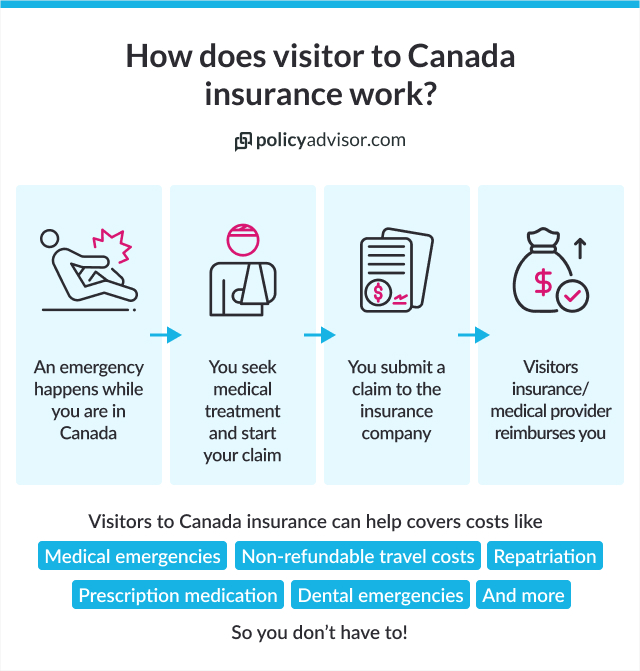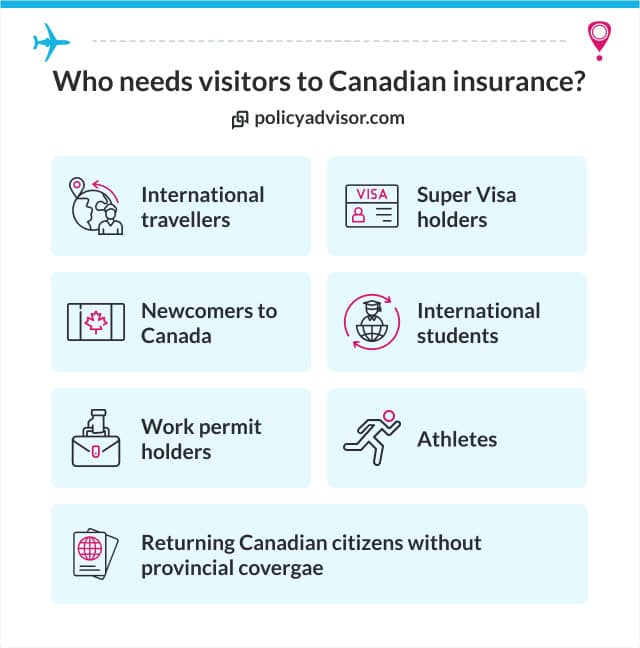- While not legally required, getting visitor to Canada insurance is crucial for financial protection against Canada's high medical costs and unexpected travel-related expenses
- Canada offers standard visitor visas for short-term visits and extended stay “super visas” for parents and grandparents, with the latter requiring mandatory visitor health insurance
- Visitor travel insurance typically covers emergency medical expenses, hospitalization, prescription drugs, and trip-related incidents, offering peace of mind during your stay
- The cost of visitor insurance in Canada varies based on age, health condition, length of stay, and coverage amount, with comprehensive plans offering more extensive protection
Planning a long-term stay in Canada? Whether you’re visiting family for extended periods or exploring Canada’s diverse landscapes, understanding visitor visa requirements is crucial for a successful trip.
This comprehensive guide covers everything you need to know about temporary resident visas (TRV), Super Visas, and the mandatory insurance requirements that protect you during your extended stay.
From application processes to cost breakdowns, we’ll walk you through each step to ensure your long-term visit to Canada is both legal and financially protected. Let’s discuss the essential information every long-term visitor needs to know.
What is a Canadian visitor visa?
A visitor visa, also known as a Temporary Resident Visa (TRV), is an official document issued by Immigration, Refugees and Citizenship Canada (IRCC) that allows travellers from foreign countries to enter and stay in Canada for extended periods. This temporary resident visa Canada is essential for long-term stays exceeding typical tourist visits.
Temporary Resident Visa vs. Regular Tourist Visa
Understanding the difference between a standard tourist visa and a temporary resident visa for long-term stay in Canada is crucial for proper planning. While regular tourist visas typically allow stays of up to 6 months, temporary resident visas can be structured for extended visits, especially when combined with proper visitor insurance coverage.
What is visitor to Canada insurance?
Visitor insurance is a specialized form of insurance intended to safeguard tourists and other visitors from unexpected medical emergencies and non-medical travel-related costs while in Canada.
This insurance typically covers a range of expenses, such as emergency medical treatment, hospitalization, prescription medications, loss of baggage, trip cancellations, and more, ensuring travellers are protected during their stay.
Who needs visitors to Canada insurance?
Visitors to Canada insurance is highly recommended for parents and grandparents, tourists, students, foreign workers, and new immigrants.
- Parents and grandparents visiting on a Super Visa (mandatory): Super Visa holders are required by the Government to have health insurance coverage for at least one year, which is essential to cover medical emergencies during their stay in Canada
- Tourists and temporary visitors: If you’re visiting Canada, having coverage for unexpected medical emergencies is crucial
- International students: Students from abroad may need additional insurance to supplement what their school offers
- Temporary foreign workers: Those working in Canada on temporary permits who might not be eligible for provincial health insurance should consider this coverage
- New immigrants: New immigrants waiting for their provincial health insurance to take effect can benefit greatly from visitors to Canada insurance
What does visitors to Canada insurance cover?
While coverage varies by policy, visitors to Canada insurance generally includes medical and non-medical travel emergencies such as:
- Unexpected medical expenses
- Emergency hospitalization
- Prescription medications
- Emergency dental care
- Ambulance services
- Trip cancellation and interruption
- Coverage for lost or stolen luggage
- Roadside assistance services
Is insurance required for visitor visa?
Yes, visitor health insurance is required for Super Visa which allows parents and grandparents of Canadian citizens to visit Canada for extended periods. For other visa types, temporary resident visa insurance is not mandatory but highly recommended. Healthcare in Canada is expensive and a visitor medical insurance policy will help you save on the exorbitant costs in case of a medical emergency.
Types of visitor visas in Canada
In Canada, visitor visas for long-term stays are primarily classified under Temporary Resident Visas (TRVs). The Immigration, Refugees and Citizenship Canada (IRCC) offers several options including single-entry visas, multiple-entry visas, and the specialized Super Visa for extended family visits.
Temporary Resident Visa (TRV)
A TRV is an official document that grants foreign nationals permission to enter Canada temporarily for purposes such as tourism, visiting family or friends, or attending events. TRVs are generally issued in two forms, single-entry visas and multiple-entry visas.
Single-entry visa: A single-entry visa allows you to enter Canada only once. If you leave Canada, you will need to apply for a new visa to return, except for trips to the U.S. or St. Pierre et Miquelon.
Typically, holders can stay for up to six months, with the exact duration determined by a Canadian Border Services Agency (CBSA) officer upon arrival. This visa is suitable for individuals making a one-time visit or attending a specific event.
Multiple-entry visa: A multiple-entry visa permits multiple entries to and exits from Canada during its validity period. This is the standard type of TRV unless a single-entry visa is specifically required.
You can stay for up to six months per visit, and the visa may remain valid for up to 10 years or until your passport expires, whichever occurs first. This is ideal for those who plan to travel frequently to Canada for different reasons.
Super Visa
The Super Visa is designed specifically for parents and grandparents of Canadian citizens and permanent residents, offering an extended stay period.
Duration of Stay: Unlike the standard visitor visa, the Super Visa allows for extended stays of up to two years per visit without the need to renew status. The visa itself is valid for up to 10 years, making it a long-term solution for parents and grandparents who wish to visit Canada frequently.
Application process/eligibility: To qualify for a Super Visa, applicants are mandatorily required to have private medical insurance from a Canadian insurance company. The policy must be valid for at least one year from the date of entry and cover health care, hospitalization, and repatriation, with a minimum coverage of $100,000.
- Relationship: The applicant must be the parent or grandparent of a Canadian citizen or permanent resident
- Invitation letter: An invitation letter from the child or grandchild residing in Canada is required. This letter must outline the details of the visit and include a promise of financial support during the applicant’s stay
- Financial requirements: The host in Canada must meet a minimum income threshold, known as the Low-Income Cut-Off (LICO), to prove they can support the visiting relative
- Medical insurance: Applicants must have private medical insurance from a Canadian insurance company. The policy must be valid for at least one year from the date of entry and cover health care, hospitalization, and repatriation, with a minimum coverage of $100,000
- Processing time: Processing times for the Super Visa can vary, but it generally takes several months. Applicants may also be required to undergo a medical examination as part of the process
How to extend your visitor visa in Canada?
If you need to extend your visitor visa in Canada beyond your initial authorized stay, you must apply at least 30 days before your current status expires. The visitor visa extension process requires demonstrating continued financial support and valid reasons for extending your long-term stay in Canada.
Applications for visitor visa extensions must be submitted to IRCC with supporting documentation. Common reasons for visitor visa extension include:
- Ongoing medical treatment requiring extended stay
- Family emergencies necessitating longer visits
- Delayed travel plans due to unforeseen circumstances
- Waiting for permanent residence applications to be processed
How long can a person stay in Canada on a visitor’s visa?
Most visitors can stay in Canada for up to six months or till your passport expires, whichever comes earlier. Super Visa holders can stay for two to five years per entry.
General visa holders who would like an extension on their stay should apply at least 30 days in advance.
What is the fee for Canada visitor visa?
The standard application fee for single and multiple-entry visas is $100 for each applicant. An additional fee of $85 is charged if biometric data is required and $170 for families who apply together.
The application fee covers the visa processing regardless of whether it is approved or not.
What is the application process for a visitor visa?
To apply for a visitor visa, start by assessing your eligibility based on your nationality and the purpose of your visit. Once confirmed, gather the necessary documents, such as a valid passport, proof of funds, and a letter of invitation if applicable.
Complete the application form, either online or on paper, and pay the required application fee. Finally, submit your application along with your biometrics, if requested.
How do I know if I’m eligible for a visitor visa?
To be eligible for a visitor visa, applicants must demonstrate that they have a valid reason for visiting, intend to leave Canada at the end of their stay, prove that they have no intention of working or studying in Canada (unless authorized), have sufficient financial resources, and be in good health.
Additionally, a clean criminal record and proof of ties to their home country are often required.
Is there a processing fee for visitor visa?
The standard processing fee is $100, but additional costs may apply for biometrics and other services. If you’re applying for additional family members the processing fee for each member is $100.
Benefits of visitor visa travel insurance
Travelling to Canada without insurance can be a significant risk, particularly due to the country’s high healthcare costs. Unlike Canadian citizens and permanent residents, who are covered under the public healthcare system, visitors are not eligible for these benefits.
This means that any medical emergency, whether it’s an illness, injury, or hospitalization, could lead to burning a hole in your pocket.
Why travel insurance is crucial for visitors to Canada
Travel insurance is important for visitors to Canada Travel insurance is important for visitors to Canada, not just as a legal requirement for super visa but also for other visitors to protect against unexpected emergencies.for the following reasons:
- Healthcare costs: Canada is known for its world-class healthcare, but only for its residents. For non-residents, even a minor medical issue can result in hefty bills. Emergency room visits, hospital stays, and medical procedures can quickly accumulate costs that can be financially overwhelming without insurance
- Unexpected events: Travel inherently comes with uncertainty. Whether it’s a sudden illness, an accidental injury, or an unforeseen event like a trip interruption or cancellation, travel insurance ensures that you are not left to bear these costs alone
- Peace of mind: Knowing that you have insurance coverage in place allows you to enjoy your time in Canada without the constant worry of potential financial burdens. This is particularly important for older travelers or those with pre-existing health conditions, who may be more susceptible to health issues while abroad
How to choose the best visitor insurance in Canada?
If you’re looking for the best visitor insurance in Canada, start by considering your specific needs, including your age, health condition, and the length of your stay. If you have pre-existing medical conditions, it’s essential to find a policy that covers them, as this isn’t always included by default.
It’s important to assess if the policy offers comprehensive coverage including emergency medical care, hospital stays, prescription drugs, and optional services like dental emergencies or return of remains.
Additionally, you must carefully review any exclusions or limitations to understand what’s not covered, such as certain activities like extreme sports or undeclared pre-existing conditions.

What is the cost of visitor insurance in Canada?
The average cost of visitor health insurance for non-residents typically ranges from $50 to $400 per month, depending on factors such as age, duration of stay, and the level of coverage chosen. For instance, younger applicants (under 30 years) may pay between $50 and $100 monthly, while those aged 70 years and older may need to pay between $200 and $400 per month.
Average coverage and premiums for different age groups
| Visitor’s age | Premiums |
| 25 years | $72.30/mo. |
| 35 years | $90.90/mo. |
| 45 years | $101.70/mo. |
| 55 years | $110.70/mo. |
| 65 years | $133.20/mo. |
| 75 years | $240.0/mo. |
| 85 years | $405/mo. |
*The above premiums are for $100,000 in coverage for an individual visiting Canada for a 30-day period. Premiums vary based on your health condition.
Factors influencing the cost of visitor insurance
Here are the factors that influence the cost of visitor insurance in Canada:
Age:
- Younger travellers: Typically, younger travellers (under 40) can expect to pay lower premiums as they are considered lower risk for health issues
- Older travellers: Premiums increase with age, particularly for those over 60 or 70, as the likelihood of needing medical care rises
Health condition:
- Pre-existing conditions: If you have pre-existing medical conditions, you may need to purchase additional coverage, which can increase the cost. Some insurers may charge a higher premium, while others might exclude these conditions altogether
- General health: A good overall health status can lead to lower premiums, while those with chronic conditions may face higher costs
Length of stay:
- The longer you plan to stay in Canada, the higher the cost of insurance. Most policies are priced based on the duration of coverage, with options ranging from a few days to a year or more
Coverage amount:
- Basic coverage: Policies with minimum coverage (e.g., $50,000) are more affordable but may not cover all potential medical expenses
- Comprehensive coverage: Higher coverage limits (e.g., $100,000 or more) offer more extensive protection but come with a higher premium
Plan type:
- Single-trip insurance: Designed for one-time visitors, this is typically more cost-effective if you only plan to visit Canada once within a specific period
- Multi-trip insurance: For those who plan to visit Canada multiple times within a year, this option might be more economical in the long run, though it generally has a higher upfront cost
Deductibles:
- High deductibles will have lower premiums and lower deductibles will lead to high premiums
Planning your long-term stay in Canada: Next steps
Securing a visitor visa for a long-term stay in Canada requires careful planning and proper documentation. Whether you’re applying for a temporary resident visa, Super Visa, or need to extend your current visitor status, understanding the requirements and having adequate insurance coverage is essential.
Remember these key points:
- Apply for your temporary resident visa well in advance of your planned travel
- Ensure you have adequate visitor insurance coverage, especially for Super Visa applications
- Prepare all required documentation including financial proof and invitation letters
- Consider visa extension options if your plans change during your stay
For personalized advice on visitor visa applications and insurance requirements, contact our licensed insurance experts, who can guide you through the process and ensure your long-term stay in Canada is properly protected.
Looking for the best visitor insurance plan? Speak to our expert advisors!
If you’re looking for visitors insurance to Canada and not sure where to start, contact us now! Our team of expert insurance advisors would be happy to go over the unique needs of your trip and give you personalized advice for the kind of policy that would be best for you. Schedule a call or start comparing customized quotes right away by clicking the button below.
Frequently Asked Questions
Is visitor to Canada insurance mandatory?
Yes, for visitors coming to Canada on a Super Visa, medical insurance is mandatory. This is required to cover health care expenses during their extended stay.
However, for other types of visitors—such as tourists, temporary visitors, international students, temporary foreign workers, and new immigrants—visitor insurance is not mandatory, but is highly recommended to protect against unexpected medical emergencies.
What coverage amount is recommended?
A minimum coverage of $100,000 is advisable due to the high cost of medical care in Canada. Opting for a higher limit can provide extra peace of mind.
Are pre-existing conditions covered?
Coverage for pre-existing conditions varies by policy. Some plans may cover emergencies related to pre-existing conditions if they have been stable for a specified period, typically 180 days, before purchasing the insurance.
Do you need insurance for a visitor’s visa?
While insurance is not required to apply for a visitor visa (Temporary Resident Visa) to Canada, it is strongly recommended. The exception is for super visa applicants, such as parents and grandparents of Canadian citizens or permanent residents, where proof of valid medical insurance is mandatory. This insurance must be from a Canadian provider, cover at least $100,000 in medical expenses, and remain valid for at least one year from the date of entry.
Can I get a refund after cancelling a visitor health plan?
Yes, visitor insurance for Canada can be refunded under specific conditions. If you cancel before coverage begins, you usually qualify for a full refund. Many insurers also offer a 10-day free-look period, allowing full refunds within that time. After this period, refunds may be issued if your trip is cancelled, your visa is denied, or if you become ineligible. However, no refunds are provided if a claim has been made on the policy.
Can I extend my visitor insurance coverage while staying in Canada?
Yes, you can extend your visitor insurance coverage while in Canada, but you must apply before your current policy expires. Extensions are typically subject to approval based on your health status, and some insurers may require you to provide proof of good health. If you’ve made a claim or your health condition has changed, your eligibility for an extension could be affected.
When planning a long-term visit to Canada, securing a visitor visa is just the beginning. Equally important is obtaining visitor visa health insurance, which offers crucial financial protection during your stay. With various types of visitor visas available, understanding the application process, eligibility criteria, and insurance options can help you enjoy a worry-free experience in Canada.








